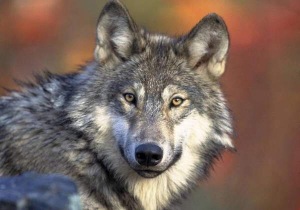By Konnie LeMay
11/24/15
Gray wolves are back, which makes it time to take the iconic animal off the Endangered Species List, many wolf researchers believe. But tribes oppose the measure.
More than two dozen wolf researchers—including the founder of the International Wolf Center—sent a letter on November 18 to the U.S. Secretary of the Interior calling for the gray wolf to again be delisted in the Minnesota, Michigan and Wisconsin. “We support the Endangered Species Act and feel it has resulted in the successful recovery of gray wolves in this region,” wrote Adrian Wydeven, coordinator of the Timber Wolf Alliance at Northland College in Ashland, in the letter. “It is time for wolves in this region to return to state management and for the Endangered Species Act to focus funds and resources on truly endangered wildlife.”
None of the signatories represent tribal wildlife managers. This is because they don’t agree. “The tribes already have a stance that we want the wolves protected, we don’t want the wolves harvested,” said Lacey Hill, wildlife specialist for the Bad River Band of Lake Superior Ojibwe in Wisconsin.
But scientists fear that leaving a recovered species on the endangered list weakens protections for other animals that might need it more, said L. David Mech, who founded the International Wolf Center in Ely, Minnesota and has written multiple books and articles on the species. “We do firmly believe that if species get listed, but never get delisted when they recover, it taints that act,” said Mech, one of the letter’s signatories, to Indian Country Today Media Network. “The tendency, then, to list new species would be reduced because they never could get off the list.”
The demise and rebirth of the gray wolf has caused contention as it unfolded over the years. In 1974 the gray wolf, sometimes called a timber wolf, was listed as endangered in the lower 48 states and Mexico. At that time, the only gray wolves south of Canada were 750 of them in northeastern Minnesota. Forty years later, the 2014 count put the combined wolf population in Minnesota, Michigan and Wisconsin at more than 3,700.
Population goals set under the act had been achieved by 1999, and the process for delisting began the following year. A final rule to delist was posted in April 2009, then withdrawn in July to allow for more public comment. By September 2009, a federal court had reversed the delisting, relisting the gray wolf as “endangered” in most affected states and designating it as “threatened” in Minnesota.
The wolf was again delisted in the region in December 2011, and the jurisdiction for managing them was turned over to individual states. Nearly half a dozen states promptly initiated wolf hunting and trapping seasons, controversial to many environmentalists and opposed by most tribes. On December 19, 2014, another federal court case resulted in the relisting of the wolf as endangered in all of the Western Great Lakes Region, including Minnesota, Michigan and Wisconsin.
But these constant court battles also endanger the Endangered Species Act, the wolf researchers fear.
They said it will be more difficult to get any species listed if it seems that the animal would be stuck with that label—along with attendant habitat use and other restrictions—whether its numbers recovered or not. Moreover, at this point, researchers like Mech believe, some areas may require culling of the wolves. “Wolves do need to be managed, and management of wolves generally means killing them,” he said, adding that it could be done either by government agents or via regulated hunting. “I don’t really endorse one over the other, but I do think for the good of the wolves they do have to be managed.”
The letter to Interior cites tribal governments among other agencies in the recovery of the gray wolf, but the philosophy of public hunting or trapping is not the philosophy endorsed by most tribes. For the Ojibwe in the area, the health of the wolf population has a unique cultural significance, tying the thriving of wolves to the thriving of the Ojibwe people.
The Bad River Band of Lake Superior Ojibwe, for example, adopted a Ma’iingan (Wolf) Management Plan opposing any harvest of wolves. It also includes a six-mile hunting buffer zone around the reservation in order to protect the four wolf packs that the tribe monitors, wolves that travel throughout the reservation as part of their territory. “There shouldn’t be any harvest [there] at all,” said Hill. “Those are Bad River wolves. But, she added, “The state doesn’t recognize our wolf management plan.”
The three wolf hunting and trapping seasons that the state designated before the 2014 federal court ruling did not honor the tribe’s buffer zone. Wydeven, a retired Wisconsin Department of Natural Resources (DNR) specialist who used to be the state’s wolf manager, said he was disturbed that Wisconsin state legislators chose to circumvent the DNR when creating the regulations and methods for hunting and trapping wolves. “Traditionally those things have been left up to the DNR,” Wydeven said, adding that while he was working with the department, the state’s wolf population rose from a few dozen to more than 770. “We’re seeing a lot more wolves than many of us ever envisioned we could see.”
While he would like to see a harvest regulated by the DNR, Wydeven, like Mech, said some killing of wolves is necessary. Because there are more wolves, there are areas where they are causing more depredation of livestock and pets—and that could have a backlash where they least want it. “We’re starting to see more conflicts,” he said. “We’re starting to see more resentment toward the Endangered Species Act.”
Read more at https://indiancountrytodaymedianetwork.com/2015/11/24/ojibwe-oppose-non-tribal-researchers-call-delisting-gray-wolves-162526



No comments:
Post a Comment